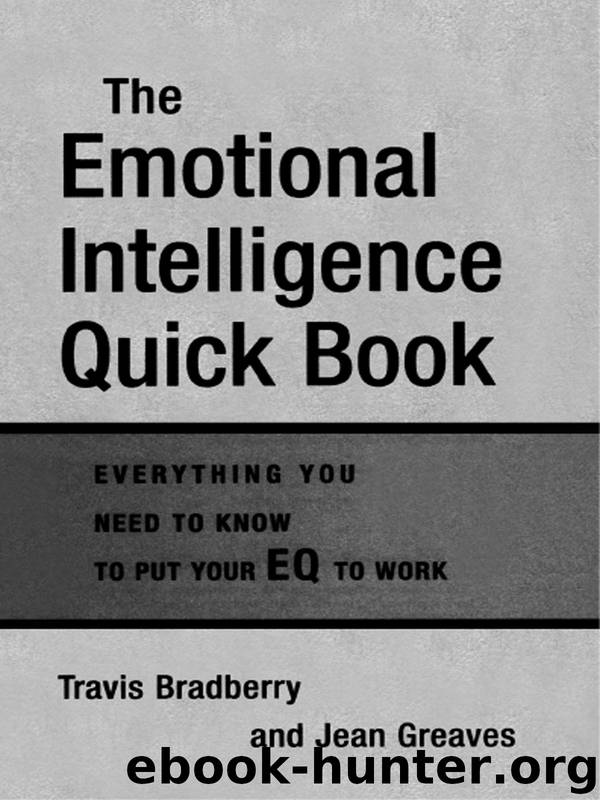The Emotional Intelligence Quick Book by Travis Bradberry & Jean Greaves

Author:Travis Bradberry & Jean Greaves
Language: eng
Format: epub
Publisher: Touchstone
Published: 2005-01-09T16:00:00+00:00
Manage Your Tendencies
Recently we talked with a room of people about their life experiences with each of the emotional intelligence skills. We asked them what works best in managing their behavior. Three men from the group sang the praises of becoming more comfortable with telling people what they don’t like to do. Specifically, they meant speaking up at work and admitting that they didn’t like being involved in certain kinds of projects and weren’t even very good at them. For them, self-management was overcoming the discomfort of admitting a “flaw.” It meant being assertive instead of sitting quietly and agreeing to do whatever was asked of them. All three men were in their late forties and early fifties, and it had taken the bulk of their careers for them to take this action. Before they could make a move, they had to learn their tendencies and then overcome the fear of being perceived as uncooperative.
Self-management is more than resisting an explosive or problematic behavior. Perhaps the biggest challenge that people face is managing their tendencies over time and applying their skills in a variety of situations. Obvious and momentary opportunities for self-control (e.g., “I’m so mad at that darn dog!”) are the easiest to spot and manage. Real results come from putting your momentary needs on hold to pursue larger, more important goals.6 The realization of such goals is often delayed, meaning that your commitment to self-management will be tested over and over again. Those who manage themselves the best are able to see things through without cracking. Success comes to those who can put their needs on hold and continually manage their tendencies.
If you are just beginning to recognize your patterns of emotion and discomfort, write down some of the things that you see, do, think, and feel in situations that are upsetting or overwhelming for you. This will help you to discover what behaviors you fall victim to when your emotions get the best of you. Talk to friends and colleagues to gain further insight. They can help you recognize your patterns and make the connection between something that happens and the way you respond. This description may just be the missing link you need.
Leaning into the discomfort of self-management also includes planning for the discomfort ahead of time. If you anticipate having a difficult conversation with the director of the PTA at your child’s school, take a few minutes to plan how you are going to handle your frustration. Decide what you will and will not say. If every time you walk into the local electronic warehouse you get excited about the new gadgets there and leave with something you didn’t really need or can’t afford, plan your strategy for dealing with the disappointment of leaving empty-handed. Your tendencies when faced with strong emotion are an important part of who you are. Just as preparation for a marathon leads to better performance, preparation for a difficult situation improves your ability to manage yourself in the moment.
When you
Download
This site does not store any files on its server. We only index and link to content provided by other sites. Please contact the content providers to delete copyright contents if any and email us, we'll remove relevant links or contents immediately.
Should I Stay or Should I Go? by Ramani Durvasula(6784)
Why We Sleep: Unlocking the Power of Sleep and Dreams by Matthew Walker(5641)
Fear by Osho(4085)
Flow by Mihaly Csikszentmihalyi(4052)
Rising Strong by Brene Brown(3780)
Why We Sleep by Matthew Walker(3771)
Too Much and Not the Mood by Durga Chew-Bose(3693)
How to Change Your Mind by Michael Pollan(3676)
The Hacking of the American Mind by Robert H. Lustig(3580)
Lost Connections by Johann Hari(3455)
He's Just Not That Into You by Greg Behrendt & Liz Tuccillo(3300)
Evolve Your Brain by Joe Dispenza(3050)
What If This Were Enough? by Heather Havrilesky(2945)
Resisting Happiness by Matthew Kelly(2887)
Crazy Is My Superpower by A.J. Mendez Brooks(2860)
The Courage to Be Disliked by Ichiro Kishimi & Fumitake Koga(2796)
The Book of Human Emotions by Tiffany Watt Smith(2770)
Descartes' Error by Antonio Damasio(2731)
In Cold Blood by Truman Capote(2684)
